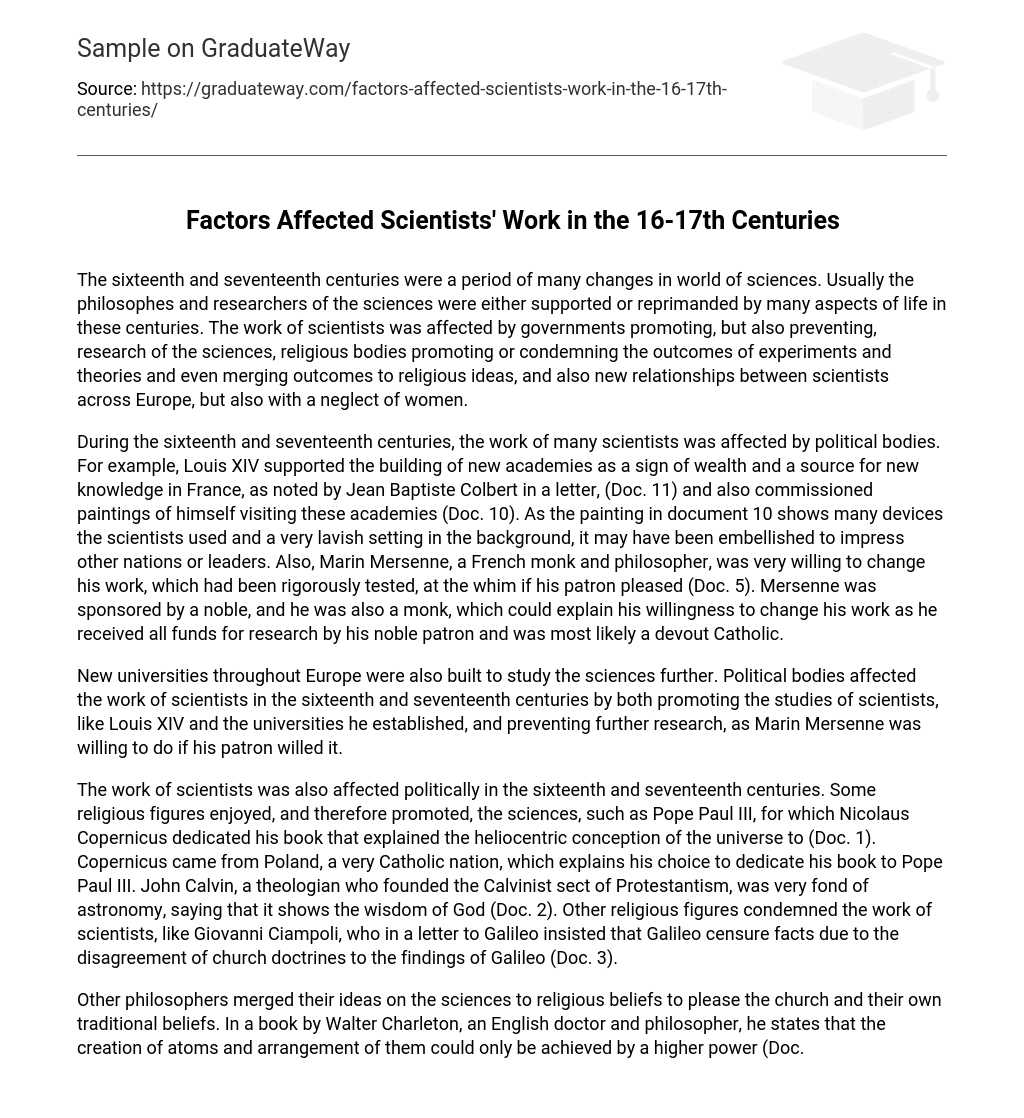During the 16th and 17th centuries, the world of sciences underwent numerous transformations. The philosophers and scientists of that era were often influenced by various aspects of life during that time period. Their work was shaped by governments both encouraging and impeding scientific research, religious institutions endorsing or criticizing experimental findings and theories, and even attempts to align scientific discoveries with religious beliefs. Additionally, these centuries saw the emergence of new collaborations among European scientists, although they largely excluded women from their ranks.
During the sixteenth and seventeenth centuries, the work of many scientists was influenced by political bodies. For instance, Jean Baptiste Colbert noted in a letter (Doc. 11) that Louis XIV supported the construction of new academies to display wealth and promote new knowledge in France. Additionally, Louis XIV commissioned paintings (Doc. 10) depicting himself visiting these academies, enhancing the scientific equipment and opulent surroundings depicted in the artwork to potentially impress other nations or leaders. Furthermore, Marin Mersenne, a French monk and philosopher, was willing to modify his rigorously tested work based on the desires of his patron (Doc. 5). Mersenne, who was sponsored by a noble and was also a monk, may have been motivated by his dependence on his noble patron for research funding and his strong Catholic faith.
Additionally, in Europe, new universities emerged with the objective of advancing scientific studies. Political entities had a significant impact on scientists during the 16th and 17th centuries. On one hand, they supported scientific endeavors, for instance, Louis XIV and the universities he founded. On the other hand, they impeded further research, as exemplified by Marin Mersenne’s willingness to comply with his patron’s wishes.
The political influence on the work of scientists in the sixteenth and seventeenth centuries was also impacted. Some religious figures supported and endorsed the sciences, such as Pope Paul III, to whom Nicolaus Copernicus dedicated his book that explained the heliocentric conception of the universe (Doc. 1). Copernicus, who came from Poland, a predominantly Catholic nation, chose to dedicate his book to Pope Paul III. John Calvin, a theologian who established the Calvinist branch of Protestantism, had a great appreciation for astronomy, as he believed it demonstrated God’s wisdom (Doc. 2). However, there were also religious figures who condemned the scientific work, like Giovanni Ciampoli. In a letter to Galileo, Ciampoli insisted that Galileo suppress certain facts as they contradicted church doctrines (Doc. 3).
Other philosophers combined their ideas on the sciences with religious beliefs in order to appease the church and adhere to their own traditional beliefs (Doc. 8). Walter Charleton, an English doctor and philosopher, argues in his book that the creation and arrangement of atoms can only be accomplished by a higher power. His background as a doctor possibly influenced this conclusion, as the intricate complexity of the human body suggests that only God could have designed such an organism. Another philosopher, Gottfried Leibniz, compares God to an engineer who manipulates his machines, thereby intertwining religious and scientific concepts (Doc. 12). During this period, many scientists faced condemnation from the church for their work deemed blasphemous. As a result, numerous scientists turned to deism, which posits that God created the Universe like a clock and allowed it to operate independently. The sixteenth and seventeenth centuries witnessed scientists’ works being influenced by various factors: support from religious institutions, such as Copernicus seeking approval from Pope Paul III for his book, condemnation of their works like Ciampoli did to Galileo, and the merging of ideas between religious and scientific beliefs as exemplified by philosophers Charleton and Leibniz.
The work of scientists in the sixteenth and seventeenth centuries was socially impacted. Francis Bacon, an English philosopher of science, believed that without a universal goal for the sciences across humanity, there would be little advancement (Doc. 4). Since Bacon was English, this quote could be about the need for a unified goal in science, considering research taking place in France and other parts of Europe where a different language is spoken. Therefore, a universal goal would be beneficial for furthering scientific progress. Another social impact on science was the development of friendships among scientists. In a letter to Johannes Hevelius, Henry Oldenbury states that friendships among the most intelligent members of society would enhance scientific and philosophical pursuits (Doc. 6). Additionally, social norms played a role in influencing the work of female scientists during this time period. Margaret Cavendish, an English philosopher, writes that despite female goddesses dominating classical mythology’s science realm, she faced exclusion from philosophical schools simply because she was a woman (Doc. 9). Thus, social effects affected scientists’ work through the establishment of new universal goals (as emphasized by Francis Bacon), formation of new friendships (such as between Johannes Hevelius and Henry Oldenbury), and the exclusion of women from academic institutions solely due to their gender (as experienced by Margret Cavendish).
During the sixteenth and seventeenth centuries, scientists faced various influences on their work. Governments both encouraged and hindered scientific research, while religious institutions supported or criticized experimental findings and theories, often merging them with religious ideology. Additionally, scientists cultivated new connections with colleagues throughout Europe. However, during this period, the contributions of women in the field were largely overlooked.





